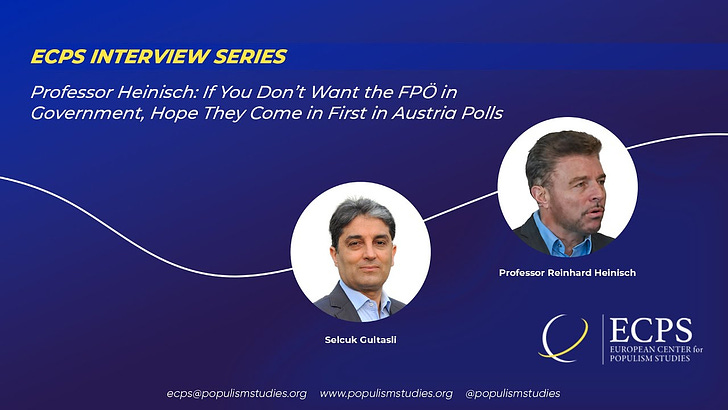Austria held its national parliamentary elections on Sunday to elect representatives for the Bundesrat, the lower House of Parliament, which will form a new government coalition for a term of up to five years.
Going into the election, polls were indicating that the far-right Freedom Party (FPÖ) would get the most votes, the center-right Christian Democratic People’s Party (ÖVP) would come in second, and the center-left Social Democrats (SPÖ) third, with no party getting a majority. The Greens and the liberal party NEOS were expected win enough votes to maintain their presence in the parliament.
Based on the currently available figures, the results came out this way for the five parties that made the threshold for parliamentary representation, based on information as of just after 8:00 PM Central European Time1:
The only coalition thinkable for the FPÖ to make would be with the ÖVP. A coalition of ÖVP-SPÖ-NEOS or ÖVP-SPÖ-Greens would be the other two most likely variants.
University of Salzburg political scientists Reinhard Heinisch gave a description just before the election of the political situation in Austria, with some important historical background and analysis of the FPÖ, in particular2:
As in other EU countries including France, Germany, and Italy, the supposedly center-right parties have tried to compete with the far-right parties by glomming on to some of their hot-button issues. Which has often resulted in strengthening the far right rather than attracting votes from them to the center-right.
That game has also played out in Austria. Although, as Heinisch notes in his discussion, the FPÖ has always complained about foreigners, but it was the ÖVP who took the lead in promoting Islamophobia. Not surprisingly, the FPÖ quickly picked it up.
Leading up to the election, the FPÖ promoted a xenophobic slogan of “Fortress Austria” as the basis for a possible ÖVP-FPÖ coalition:
Four days before the Nationalrat [lower House of Parliament] elections, constitution spokeswoman Susanne Fürst (FPÖ) has called on the ÖVP to build the "Fortress Austria" together. Only with the FPÖ can the strict migration course propagated by the ÖVP be implemented, she asserts. …
As examples, she cited the establishment of return centers, deportations to countries of origin, especially to Afghanistan and Syria, securing external borders, and stopping of development aid for countries that do not cooperate. These measures would only exist in an ÖVP-FPÖ coalition, she claims.
She appeared pleased that Finance Minister Magnus Brunner (ÖVP) will be responsible for migration as EU Commissioner in the future. "The ÖVP and Brunner will receive our full support and backing," provided they follow up their proposals with deeds. There was criticism for Brunner's positive view of the EU migration pact. She claims the pact "only wants to declare illegal immigration legal".3
Rule #1 for dealing with nativism: xenophobes lie.
If one doesn’t keep that in mind, it’s impossible to navigate their claims, e.g., “they’re eating the dogs, the people that came in, they’re eating the cats.” (Donald Trump)
Xenophobes lie. It’s how their ugly game works.
Hannes Amesbauer, the FPÖ security spokesperson who is considered a possible cabinet minister, claims that in the past five years, there have been on the average 340 reports a day about people from other countries. He bases the need for a “Fortress Austria” on “knife attacks, gang wars, Islamism, and the danger of terrorism.”
The rightwingers in Austria use “knives” as a symbol for scary foreigners and Muslims. I guess it’s supposed to sound dangerous Oriental, or something.) Yes, it’s brainless. But that’s how demagogues roll. The crime rate among foreigners in Austria and in most (all?) EU countries is consistently lower than among native-born Austrians. The non-native born Austrians would be much safer if all the native-born Austrians were to leave.
On the day of the election, Deutsche Welle English posted a surprisingly bad discussion of the state of Austrian politics.4 Really lazy journalism in that one.
Even though Austria is a small country, the outcome of the coalition negotiations could also have some effect on the EU’s position on the Russia-Ukraine War:
Christoph Schwarz, a Research Fellow at the Austrian Institute for European and Security Policy, said if the FPÖ enters the government, “one can assume that Austrian support for EU initiatives in support of Ukraine will be harder to attain.” Even so, he adds, much would depend on “political bargaining and the composition of such a government.”
The FPÖ and United Russia, Vladimir Putin’s party, signed a Friendship treaty in 2016. The FPÖ’s Russian connections have led to bizarre moments. Karin Kneissl, appointed Austria’s foreign minister on the FPÖ’s recommendation in 2017, danced with Putin at her wedding in 2018. Kneissl now lives in Russia, where she was recently appointed goodwill ambassador for Siberian tiger conservation. The FPÖ has since distanced itself from the Friendship treaty, but ties between the far-right party and Moscow have survived.5
Without trying to summarize all the complications of the hype and the genuine worry about illegitimate Russian interference in EU elections, it is legitimate to call the FPÖ a Putinist party. They lean heavily in the direction of EU authoritarians like Hungary’s Viktor Orbán and France’s Marine Le Pen.
Das Ergebnis, die möglichen Koalitionen: Die Nationalratswahl 2024 im Überblick. Der Standard 09/29/2024 (20:12pm CET). <https://www.derstandard.at/story/3000000237888/das-ergebnis-die-moeglichen-koalitionen-die-nationalratswahl-2024-im-ueberblick> (Accessed: 2024-29-09).
Prof. Heinisch: If You Don’t Want the FPÖ in Government, Hope They Come in First in Austria Polls. ECPS Brussels YouTube channel 08/28/2024. (Accessed: 2024-28-09).
FPÖ will mit ÖVP „Festung Österreich“ bauen. ORF 09/25/20024. <https://orf.at/stories/3370860/> (Accessed: 2024-29-09). My translation from German.
Far-right FPÖ set for big win on 'Fortress Austria' platform. DW News YouTube channel 09/29/2024. (Accessed: 2024-29-09).
Junyen t, Marc Martoreli (2024): Austrian election could complicate EU Ukraine war policy. Responsible Statecraft 09/24/2024. <https://responsiblestatecraft.org/austria-elections/> (Accessed: 2024-29-09).




Sad news out of Austria...